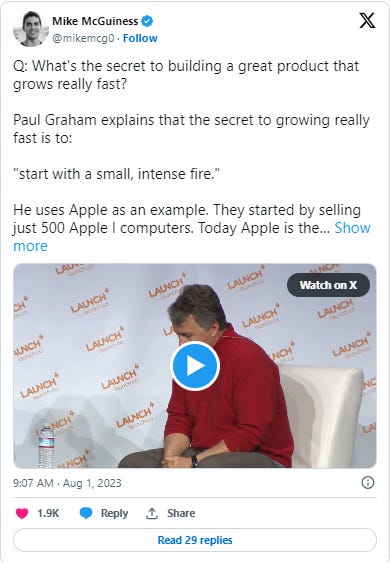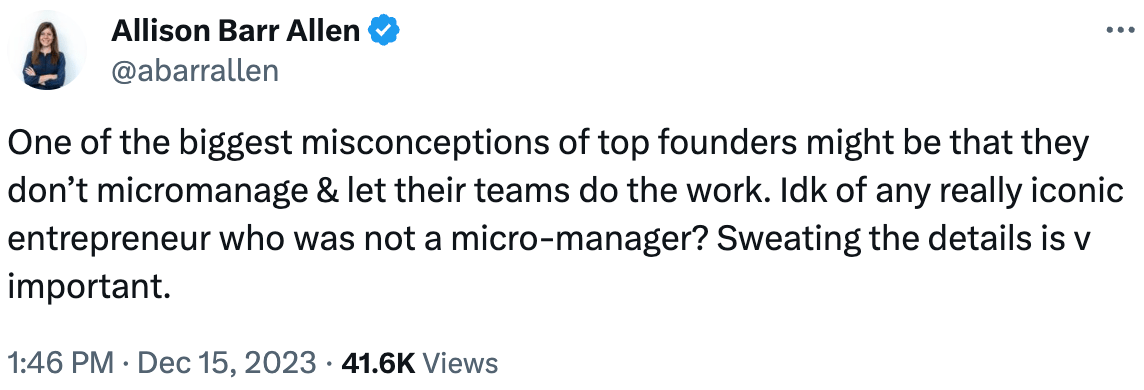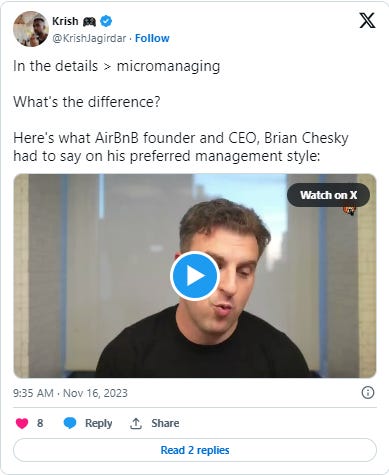Why Brian Chesky Tells Founders to Stay in the Details
And a simple startup idea you can bootstrap quickly
Hey y’all!
On Saturday I shared a deep dive on [topic]. Upgrade to get access to my library of 70+ deep dives, and a new one in your inbox each Saturday.
Here’s today at a glance:
Opportunity → Loom-to-Doc
Framework → The Canada Rule
Tool → Folk
Trend → Sleep
Quote → Be in the Details
💡 Opportunity: Loom-to-Doc
Loom is one of my favorite productivity tools. I use it to record short screen recordings that I talk over and send to my team. Usually these are instructions for how to set up or manage some process (a very common use case).
I can save these in Notion docs or some Google Sheet for reference later, but often they get lost once they’re initially sent and watched.
Loom is trying to address this by adding titles to each video automatically with AI and making them searchable on their site, but that’s a new behavior everyone needs to buy into, and so there’s a lot of very valuable info gets lost.
But what if you could turn those into written docs automatically, in a tool you’re already using (Notion, Google Docs, etc)? It’d be a lot easier to manage.
Even though Loom works with big, attractive enterprise companies I’d focus the GTM initially on individual users and take a land and expand approach. If the tool is helpful, it’ll spread within the company.
Content marketing should also be helpful here — the magic is in seeing this in action. Well-done videos have a chance to get some attention and build early momentum on social.
As Marc Andreessen says, enterprise sales are like Moby Dick for small startups. You can’t rely on them to show up (or in this case close) and the sales cycles are so long that they’ll consume all of your time and attention.
Loom was recently acquired by Atlassian, so I imagine their internal product roadmap will be increasingly focused on integrations with other Atlassian tools like Jira — that leaves space for a new entrant to build something like this that works with every other tool.
🧠 Framework: The Canada Rule
It’s possible to drown in opportunity. When you’re building a startup you think anything is possible, and it’s easy to fall victim to shiny object syndrome by chasing too many opportunities at once.
Paul Graham says startups should focus on serving a very specific customer by building a small, but intense fire:
A common example of this is geographic expansion. If you’re successful in one country, or region, why not expand to another before some local competitor springs up and captures the market?
We faced this issue when I was helping build Uber Eats. We were only in a few markets when I joined, and were aggressively expanding across the US.
Why didn’t we expand faster to LATAM, APAC, or EMEA? Local competitors like Deliveroo, Rappi, and Grab (among others) were able to gain a foothold.
The answer is because of what happened with Uber’s ridesharing business: it eventually exited China and Russia due to having to fight too many battles at once.
Turns out learning the unique aspects of new markets is hard and the added complexity and competition are expensive.
Netflix’s co-founder Marc Randolph calls this The Canada Rule:
🛠 Tool: Folk
Founders juggle many different contacts during a day, whether it’s having a call with a investor, sending emails to a future hire, managing a sales pipeline and so on. Chances are you're leaving a lot of money on the table.
Folk is an all-in-one CRM that centralizes all of your relationships and lets you create custom workflows from a recruiting pipeline to managing your deals and more. 1,500 startups are using and loving Folk already, and now Houck's Newsletter readers get a 10% discount on the annual plan with the code FOLKXHOUCK.*
📈 Trend: Sleep
Good sleep is popular, and increasingly so. Maybe you know someone who took Matthew Walker’s Masterclass on sleep from a few years ago, or bought an Eight Sleep mattress and talks about it all the time.
The bottom line is that within the health and wellness space, sleep is one of the areas that’s most approachable and easiest to understand the benefits of.
I caught up with Sagar Chopra, a friend and former coworker from Uber, to jam on this trend.
Sagar and Sahil, a Harvard-trained MD, co-founded Empower Sleep to increase sleep quality for millions of people.
My firm invested in their initial round in 2022, and they’ve since built tons of insights into their product to help people get better sleep.
Here’s what Sagar had to say when I asked him about this trend:
Q: Why is it trending?
Consumers are becoming more focused on their health & wellness, and sleep is inevitably at the foundation of this. Thanks to research and influential endorsers (Huberman, Huffingtons, Matthew Walker, etc.), good sleep now perceived as a measure of success.
To support this, wearables are on the rise and have increased awareness around general sleep quality.
Lastly physicians are becoming more educated around sleep and how poor sleep health is inextricably linked to every disease known to mankind (poor sleep = mental health issues, cardiovascular disease, obesity, poor hormonal health, the list goes on).
As a result, there is more screening for sleep disorders like insomnia & sleep apnea. In the U.S. alone, ~70M humans have a sleep disorders, and billions worldwide.
Upgrade to read our chat in full along with my take on where the market is headed:
💬 Quote: Be in the Details
What do you think of when you hear the names Brian Chesky, Steve Jobs, Elon Musk or any other legendary founder?
Chances are you think about their ability to see the future and how they were able to craft a strategy to turn that vision into reality.
It’s their vision, and the resulting impact on the world, that gets remembered and idolized.
But another defining characteristic of hyper-successful founders is that they’re intensely in the details of their startup:
When I was a Product Manager at Airbnb it was clear that this was true. I was initially shocked at how involved Brian was in seemingly small design or product changes.
But he’s right that this is how you need to be if you want to understand your customers and build something that delivers a consistent experience with a high bar.
If the value you add as a founder is your ability to craft high-level strategies or the vision for where the company could potentially go then you’re probably not doing the things you need to actually build your startup. You become a glorified middle-manager between your investors / board and your employees.
Ironically, the right strategy naturally emerges from being in the details — you have more information about what’s happening and can make more informed decisions.
🔗 Houck’s Picks
Looking for Knowledge Management Software you will actually like to use? Try eniston.*
Good collection of advice on finding product-market-fit (Link)
Enterprise sales advice for startup founders (Link)
If you’re in this cohort, make sure you have good unit economics (Link)
Two inevitable truths of ideal customer profile (Link)
Hiring engineers in the US just became a lot harder (Link)
A list of bad experiences founders have had with various service providers (Link)
Upgrade to see my full list of picks this week:
What Peter Thiel would look for when joining a startup
A tactic to protect against your startup’s own weaknesses
Why the death of Invision is not surprising
How Carta should have handled their recent PR nightmare
A short essay on why product validation is a mirage
Reminder: assess how serious VCs are before sharing too much
Rick Rubin on why you shouldn’t build products for your users
There’s nothing like the emotional weight of being a founder
💡 How I Can Help
Become a member to join the community, get access to all 70+ deep dives, and fireside chats with experts.
Growth
Grow your audience + generate leads with my growth service.
Fundraising
Share your round with hundreds of investors in my personal network.
Hiring
Hire curated candidates from top startups and communities.
Advising
I’ll help solve a specific challenge you’re facing with your startup.
🚀 Advertise in my newsletter to get in front of 75,000+ founders.
📅 Upcoming Events
Each month I host fireside chats, workshops, and meetups in cities around the world. You can find all past and upcoming events here.
Securing Your IP [Members Only]
If you're changing the world, chances are people will try to copy what you're doing. At the same time, founders have minimal money and time to invest in IP protection.
How can you protect your startup while still moving fast?
Ed Steakley is the Managing Partner at Cognition IP, a Y Combinator backed law firm making world class patents and trademarks more accessible for startups and scaleups.
We'll be hosting him for a members-only fireside chat + open AMA on January 11th at 1pm EST.
Practical Design for Founders [Members Only]
When should you bring a designer onto your team or a specific project, and what types of designers are there? When should you hire vs work with an agency? How do you avoid over-designing in the early stages?
Phil Hedayatnia has helped hundreds of founders across South Park Commons, Y Combinator, and more go from 0 to 1 and beyond with his agency, Airfoil Studio.
He’s joining us for a members-only fireside chat + AMA on January 18th at 1pm EST.









